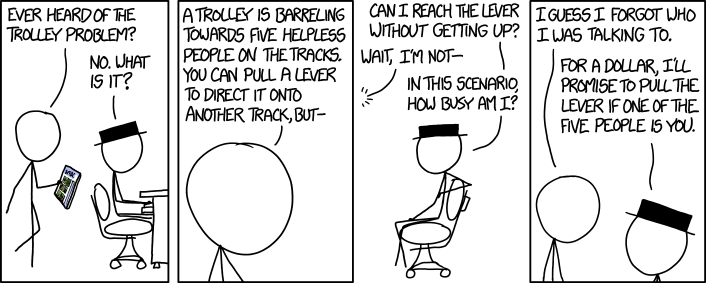 |
| (Cartoon from explainxkcd.com) |
A recent social-science experiment produced a result that favors the pro-religion argument. Based on the runaway trolley car problem (do you sacrifice one person to stop a runaway trolley that will definitely kill five other people?) [bold added]
[New York psychologist Jeremy] Ginges gave the question—to push or not to push—a religious twist. His participants were Muslim, and most were personally religious (more than 80% reported praying regularly). He presented them with two versions of the thought experiment. In one, the endangered children were fellow Muslims. In the other, they were Jews. In both, the sacrificial victim was a Palestinian of unspecified religion. He then asked his young volunteers to consider, in each case, how one ought to act—and then how they thought God would want people to act.Despite decades of conflict, of the 555 Palestinian teenagers
55% of respondents indicated that the religion of the threatened children would make no difference to their behaviour; 42% said they would be more likely to act to save their co-religionists than to save the Jewish children; and 3% swung the other way, saying they were more willing to save Jewish children than Muslim ones. When asked to consider how their God would prefer them to act, this pattern became even more pronounced. Then, 66% said religious affiliation would have no impact on their actions. Only 30% of respondents favoured the Muslim children.One cannot conclude a great deal, based on familiar weaknesses in these studies. For example, what the subjects say about their future behavior often differs from how they actually behave, and in the real world the choices are multiple, not binary (how do they evaluate a teenager choosing to sacrifice himself? It does happen.)
Nevertheless, as we enter the New Year, there's a smidgeon of hope for the future.
No comments:
Post a Comment